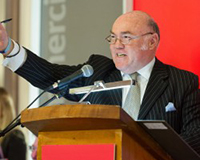 Isn’t sentiment a wondrous thing? The election fog has cleared, leaving a blue sky; the banks have loosened the purse strings; tenant demand is up; and the football season has (thankfully) come to an end.
Isn’t sentiment a wondrous thing? The election fog has cleared, leaving a blue sky; the banks have loosened the purse strings; tenant demand is up; and the football season has (thankfully) come to an end.
Surely we have some justification in taking a moment to savour the start of summer, to reflect on the past few momentous months – both in our corner of the market and on the wider stage – and to look at how sentiment has developed in the auction room.
Anticipating an inconclusive result from the election appeared to put a drag on the private investor market, as sellers and buyers adopted a more cautious stance. Preliminary figures for the main auctioneers indicate that values raised and volumes sold in the first half of 2015 differed little from the first half result from 2014. Bearing in mind the enthusiasm being shown by the market in the second half of 2014, which delivered bumper sales figures for many firms, this result is perhaps surprising.
The one major outside influence was the election. The uncertainty arising out of the prospect of a hung parliament, with all the attendant confusion, could well have been the catalyst for increased activity in late 2014, as well as accounting for the loss of momentum in early 2015 as the election loomed.
Although a number of buyers confessed to us that the impending political situation made them draw back, the possibility of less competition did pull in a number of regular bidders, on the assumption that if there was to be less competition, there might be more bargains. One man’s hesitation can be another man’s opportunity: a maxim for the market, if ever there was one.
As the commitments to sell in the May round of auctions had been made with this pre-election sentiment in the air, there was a perception of tight supply. Couple this with the reality of post-election relief, and a number of strong results came through in the May sales. Confidence in the regions, for example – flagged by us some months ago as likely to improve – was clear. Some 50% by value of our May sale was outside the South East, against a five-year average of 43%, representing nearly two-thirds of the volume. Competition for regional investments was keen, with 70% of reserves being comfortably beaten.
Multi-let, mixed-use lots requiring intensive management have long been a staple of the auction room. May was no exception, producing some of the bigger battles of the day. The enduring appeal of London attracted a number of bidders, who fought over the Barclays bank, with six flats, on Cricklewood Broadway, NW2. It was eventually knocked down to a local investor at £3m (a 4.5% yield), a result almost 25% in excess of reserve. Similarly, at the less glamorous end of the market, multi-let, part-vacant blocks in Dereham in Norfolk and Keynsham in Avon, were knocked down after around 60 bids had been made. It is always difficult to identify whether the appetite for risk has improved or the perception of risk has diminished. Either way, these results are encouraging.
At the quality end of the market, there continues to be strong demand from a broad range of investors. Even with the election result likely to be favourable to business, there is still sufficient uncertainty in other investment media to generate demand for the “safe haven” investments. Over the past 15 years, when we sold £5bn of good secondary retail, the best quality investments have sold in a remarkably narrow yield band of between 4% and 5%, reflecting both the long-term stability and the continuing appeal of the sector.
By comparison, the less secure sector has seen yields across the range of 6% to 11%, as investor sentiment fluctuates with the variations in both the local and national economic climate.
As an auctioneer, I am only too aware of the emotional appeal of property investment. Appealing to a bidder’s emotions is often what makes the difference between a good result and an exceptional one. Getting sentimental about property is never advisable – after all, it is only bricks and mortar. Understanding the sentiment, however, is the key to success.
Duncan Moir is a partner at Allsop










